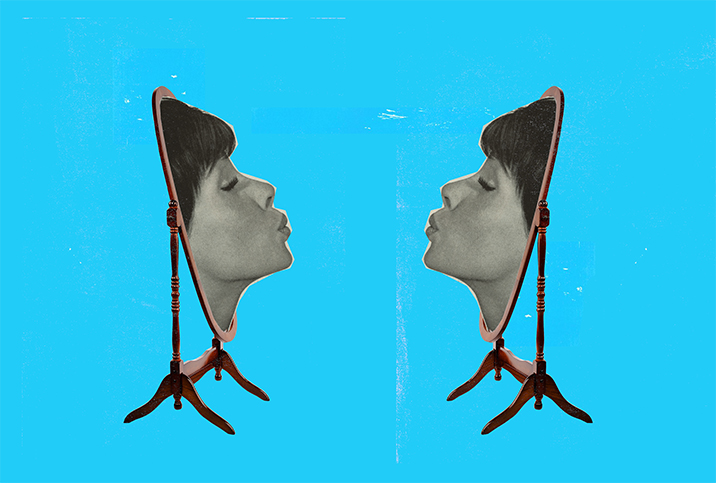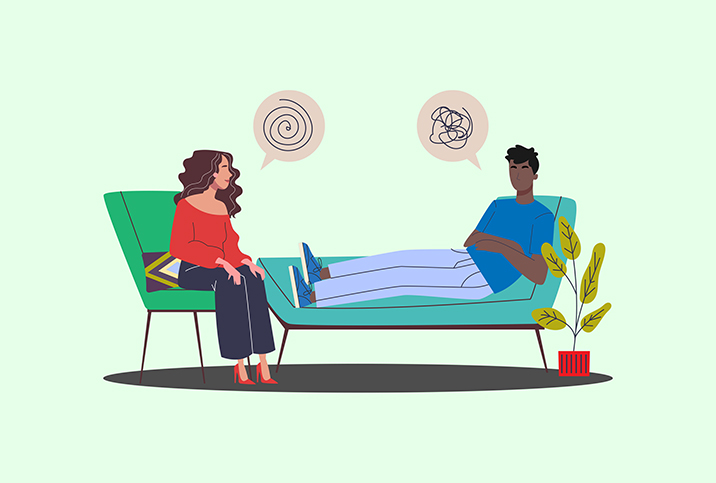Why Are You Attracted to Your Therapist?

Key Points
- Transference is when someone shifts their feelings for one person onto another person, usually romantically or sexually.
- Almost 70 percent of therapists have felt sexual attraction toward their clients and 25 percent have fantasized about having a romantic relationship with them.
- Feeling attracted to your therapist is no reason to be embarrassed or ashamed, but you have to work through these feelings so you continue to benefit from therapy.
You share your innermost thoughts and feelings with your therapist and feel comfortable displaying all your emotions. It may feel like they know everything about you, perhaps even more than your closest friend or family members.
Then one day, it hits you: You're attracted to your therapist.
If that sounds familiar, it's because this happens a lot. So much that there's even a name for it: erotic transference.
Transference is when someone shifts their feelings for one person onto another person, usually romantically or sexually. It can occur in various dynamics, especially in a client-therapist dynamic.
Sometimes, these romantic or sexual feelings may become profound, such as in Louise's case.
She began therapy in 2018 in England but had to stop one year later after her feelings toward her male therapist became too intense. So strong was her obsession with him that she started stalking his family members online. Louise even asked some of her therapist friends about the ethical timeframe for therapists to date their clients.
"I was sure he felt the same way and he confessed that he found it hard to maintain boundaries with me. That was an exciting challenge," said Louise, who requested her full name not be used.
Her feelings were fueled by how emotionally uninhibited she could be during the therapy sessions.
"I loved feeling listened to and unloading all my emotional baggage onto him," she said. "I could tell him anything—even how horny I was—without the pressure or expectation of opposing views. When I had my last session with him, I wrote him a long letter detailing my attraction to him.
"The whole thing was an exciting and intellectually stimulating experience, but it messed me up and put me off therapy."
Louise hasn't been to therapy ever since.
How common is erotic transference?
Like Louise, many people have reported feeling romantically or sexually attracted to their therapist, if the multiple sentiments on social media are an accurate measure.
Research into this phenomenon is limited, but it's a common occurrence. Matt Glowiak, Ph.D., a licensed clinical professional counselor with Choosing Therapy in Bolingbrook, Illinois, has experienced it firsthand.
"Unfortunately, I have had multiple experiences where clients were sexually attracted to me," Glowiak said. "When I worked at a methadone clinic, I had a client admit that she was putting in a little more effort in her appearance during our therapy sessions—as opposed to when she came in for her methadone dose from the nurse—because she found me attractive.
"Such occurrences are not uncommon, and even though they can create a complex situation, therapists have been trained to handle them professionally."
Of course, in much the same way, therapists are vulnerable to becoming attracted to their clients. This is known as countertransference. According to a January 2022 study published in Archives of Sexual Behavior, 70 percent of therapists have felt sexual attraction toward their clients and 25 percent have fantasized about having a romantic relationship with them.
Since therapists are trained for such circumstances and have strategies ready to keep any stray feelings from becoming reality, this rarely leads to a relationship with the client.
Recommended
- Does Normalizing 'Therapy Speak' Help or Hurt Our Relationships?: Therapist-like terms could be weaponized by your partner and friends to do you harm.
- Commonly Misused Therapy Terms, Corrected by Therapists: Using these terms, even in your dating app profile, may lead to manipulation or emotional abuse.
- The 'Ideal' or 'Perfect' Penis Size Has Evolved Over the Past 700 Years: Penis length in paintings of male nudes has increased dramatically, a new study shows.
What causes erotic transference?
Emotional feelings for your therapist can occur for a variety of reasons.
Most therapy involves a lot of vulnerability and deep emotional connections. For many clients, the therapeutic relationship is among the most intimate they will ever have. It may be more intimate than a physical sexual experience, according to Glowiak.
A lot of this has to do with the safe space created by therapy in which your therapist can listen and respond to you without any form of judgment. You're sharing your deepest secrets, which you've probably never shared with anyone else, so it's easy to develop romantic feelings.
"This level of vulnerability in therapy can result in the projection of desires and unmet needs," said Becky Spelman, a psychologist and the founder of The Private Therapy Clinic in London. "Some clients end up confusing the emotional connection they have with their therapist for romantic or sexual attraction, viewing them as an idealized partner."
Another reason erotic transference happens is the power imbalance between a therapist and their client. A therapist represents a figure of authority, empathy and understanding, which may be attractive to some clients.
It's important to remember that feeling attracted to your therapist is a normal part of the therapeutic process and your therapist is trained to guide clients through these feelings.
How to navigate erotic transference
You shouldn't feel compelled to stop therapy if you notice that you're developing such feelings. You can take six steps to help guide you through these feelings, both individually and with your therapist's support.
1. Recognize and accept the feelings
Understand that these feelings are not unusual and feeling this way doesn't diminish your worth. Recognizing what your emotions are is an essential first step toward addressing how they make you feel.
2. Reflect on the underlying reason
Ask yourself if there are unmet needs or unresolved issues from your past that might be contributing to these feelings. The answers can provide valuable insight into your journey and help you gain a better understanding of yourself.
Why Do Some People Think Serial Killers Are Hot?: What is it that causes admirers to fall for some of the most notorious criminals in history? And do they love them despite their repulsive crimes or because of them? The reason could be hybristophilia, a shared trauma or an attraction to 'bad boy' behavior.
3. Discuss your feelings with your therapist and seek professional guidance
If you feel comfortable doing so, you can discuss all you're feeling with your therapist. By discussing your feelings, your therapist can help you process these emotions and continue your therapeutic journey along a healthier path.
A supportive therapist is not only trained to handle this issue ethically but will create a safe space to explore your emotions without any judgment. In many cases, discussing this attraction can pave the way to a deeper discussion around factors leading up to what's happening.
"For example, perhaps a client was sexually exploited by a counselor or someone else in the past, or perhaps they're struggling to value themselves beyond their sexuality," Glowiak said. "Given that the counseling session serves as an example of how the client responds to their real-world environment, uncovering these key factors may be another step toward healing."
4. Focus on therapeutic goals
Try to stay focused on your therapy goals and the reason you originally sought therapy so your feelings of attraction don't negatively impact your progress.
Use your sessions to explore and work on the areas that you want to address. You can try visualizing what you want to get out of the therapy sessions to help you stay focused.
Focusing on your personal growth and well-being can gradually shift your attention away from the feelings of attraction.
5. Practice self-care and self-reflection
"Some people might find it useful to practice self-care activities that promote self-reflection, such as journaling and meditation," Spelman said. "This can help you to gain clarity, process emotions and develop a deeper understanding of yourself outside of therapy."
6. Understand these feelings will not develop into a romantic relationship
Even if you are attracted to your therapist, you have to accept the fact your therapist will not reciprocate your feelings.
Spelman stressed that there are ethical guidelines in therapy that emphasize the importance of maintaining appropriate boundaries to prevent harm and maintain the integrity of the therapeutic process.
The bottom line
Know that feeling attracted to your therapist is not a reason to be embarrassed or ashamed. Emphasis has to be placed on working through these feelings so you can continue benefiting from therapy. If necessary, you can try seeking additional support from a therapist specializing in transference.
However, if you do follow these steps and still find that your attraction is getting in the way of positive therapeutic outcomes, it may be appropriate to find another therapist. It may sound daunting, but there is a lot of information online that provides helpful advice and your current therapist should be more than happy to offer some strategies that work for you.
"Ultimately, the goal of therapy is positive change," Glowiak said. "If that's not happening, then the purpose of therapy has been defeated and it may be time to move on."


















